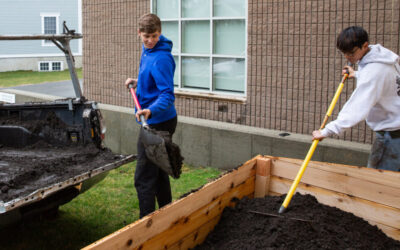
Food systems can sometimes be overlooked when it comes to assessing our impact on the planet, but they’re the focus of one of three working groups established by Concord Academy’s Sustainability Plan, which the school adopted in 2019. “The dining hall team recognizes the significant interest in eating sustainably here at CA” says Shawna Penders, food services general manager. “We are making huge strides toward the sustainable food system goals we’ve been targeting in the sustainability plan, especially in terms of promoting plant-forward menus every day.”
At CA, Sodexo, the school’s dining services provider, is using plant-based recipes from the Humane Society and offering a variety of vegetarian and vegan options at lunch and dinner and identifying them visibly on menu signage. The dining hall purchases local and organic vegetables from Costa Produce, which buys directly and indirectly from 40 to 50 farms , ranging in size from just a few acres to several hundred, and grower co-ops spread throughout New England. Nashoba Brook Bakery supplies local, fresh breads from just a few miles away. And a beverage machine from Bevi—Eliza Becton ’02 is the company’s co-founder and head of product—dispenses a variety of flavored still and sparkling water.
Meat-based offerings are also planned with sustainability in mind. The dining hall purchases pork from Clark Farm in Carlisle, Mass., which has been in agricultural production since the 1700s. It’s also a source of certified organic vegetables and berries for CA. On weekends, CA student groups visit the farm and bring back ingredients that are featured in the dining hall at Sunday dinners. Fish is purchased through Red’s Best Fish, headquartered on the historic Boston Fish Pier. Red’s Best aggregates catches from local coastal communities, networking small boats and tracking catches from each fishing vessel—sustaining the livelihoods of fishermen while also sustaining fisheries for harvest.
In addition to promoting plant-based, vegan, and local meal options, Concord Academy’s dining hall has also committed to reducing food waste. Recently, the dining hall launched Lean Path, a program that prevents on average 50% of wasted food. Using the program, the dining hall team can rapidly and easily capture food waste data, giving clear insights into what is being wasted in the kitchen and why. “With this new understanding, our team can implement targeted operational and behavioral changes to help end avoidable food waste,” Penders says, “at the same time we improve our kitchen’s efficiency.”
Since December 2021, the dining hall has also partnered with Rescuing Leftover Cuisine. To date, the CA kitchens have donated 342 pounds of food, creating 285 meals served to families experiencing food insecurity. Any additional food waste and remaining food scraps are collected in the dining hall for compost, which is picked up by Black Earth Compost. Compostable waste is diverted from a landfill and brought to a local farm where it naturally breaks down into reusable, rich, black compost. The dining hall composts about a ton of material a month. Residents and boarding houses have also begun to compost.
CA’s dining services team continually evaluates the sustainability measures it has adopted, and this work is sustained in partnership with the CA community, including the CA Environmental Sustainability Task Force and Student Food Committees, which collaborate on sharing visions for greater sustainability and setting specific goals for CA’s dining options.


